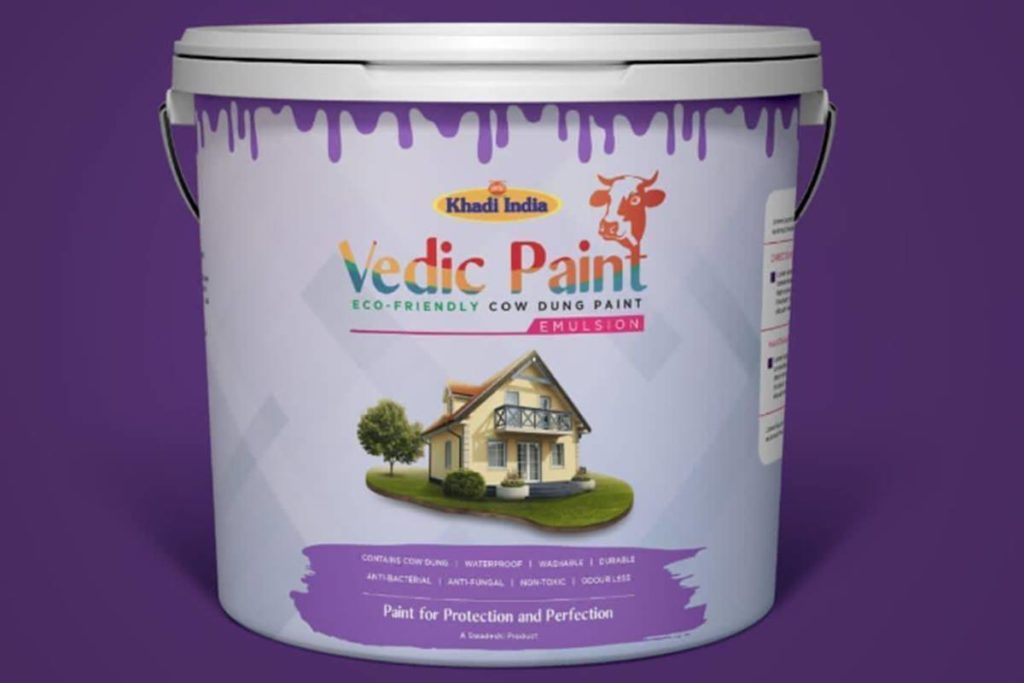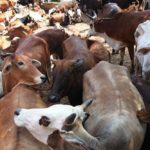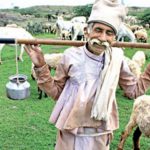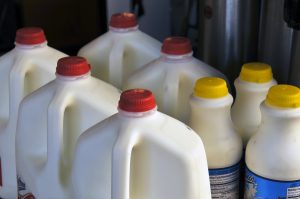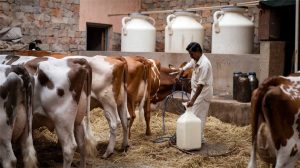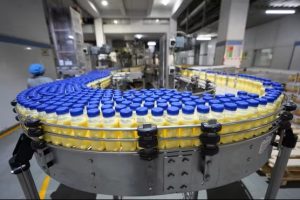
Apart form the ‘ahimsa’ philosophy, the economic utility of cow has played a role in its elevated theological status and being a reverred animal in many cultures. Well, there are more reasons for rearing the animal, other than religious.
The daunting goal of doubling farmers’ income needs action on multiple fronts. A steady source of additional income for cattle growers is being explored by the Khadi and Village Industries Commission (KVIC) with the innovative technology of ‘Khadi Prakritik’ paint made out of cow dung. The eco-friendly, non-toxic, odourless product with anti-fungal and anti-bacterial properties, could potentially enable a farmer to earn additional Rs 30,000 from one cow annually.
Anupama, a young woman in early 20s living in Sector 135, Noida has 4 cows and 2 buffaloes. She and her family prepare ‘upla’ — dried and round-sized cake made out of cow dung — and on some days earn some Rs 70-100/day by selling the surplus stock after domestic use of upla as cooking fuel. But the income stream is not steady, as the demand for upla is erratic.
Come to think of it. Anupma could take cue from a few farmer families on the outskirts of Jaipur who now make regular income of Rs 5/kg by selling raw dung. The KVIC technology allows use of cow dung as the main raw material for manufacture of white paint — emulsion and distemper. With an estimated potential sales of Rs 6,000 crore of these paints in next two years, farmers could expect to get Rs 1,000 crore by selling raw cow dung, which is now largely wasted, according to Vinai Kumar Saxena, chairman of KVIC.
“We sell upla at Rs 1/piece. Up to 5 uplas could be made from one kilogram of dung,” Anupama says. A steady income at a marginally higher rate from raw dung could be rewarding for her family, she says, given the saving on labour and the potential for steady demand for the material. According to sources, 150-170 kg of dung is required to produce of 500 litres of Prakritik paint.
KVIC has been sourcing the raw material from a cow shelter (gaushala) in Jaipur, rather than from individual farmers, ever since the product was launched by minister for micro, small and medium enterprises (MSME) Nitin Gadkari in January. Small farmers with 4-6 cows use the dung as crop nutrient and reduce the cost of of crop production by cutting down on the use of chemical fertilisers like urea and DAP. Dairy units and other large farmers who are getting just Rs 300-500 per tractor-load of cow dung, could make monetary gains thanks to the KVIC product.
Saxena told FE that that while KVIC is currently paying only Rs 5/kg for raw cow dung procured from gaushalas and small farmers, it intends to increase the rate to Rs 10/kg. Since the launch of the product two month ago, KVIC has sold 6,000 litres of Prakritik paint, via online as well through retail outlets.
KVIC has priced the distemper at Rs 160/litre and emulsion at Rs 290/litre (white). While acrylic distemper prices of many established brands (in 10 litre pack) are lower (Rs 55-140/litre) than that of Khadi Prakritik, KVIC’s emulsion is cheaper compared to synthetic variants (Rs 345-600/litre).
“We have chalked out a plan for promotion of these products starting from imparting training to small entrepreneurs to appointing dealer networks. We are scaling up operations to popularise the products,” Saxena said.
Currently, KVIC’s Jaipur-based 500-litre per day facility is the only production centre, which is likely to be upgraded to 1,000-litre per day capacity by end of May. Besides, there is also plan to set up six more plants of 500-litre capacity each in Odisha, Gujarat, Maharashtra, Uttar Pradesh and Madhya Pradesh in April, he said.
KVIC is confident that leading players in the Rs 60,000-crore domestic paint industry would consider investing in Prakritik technology in due course.
To set up a plant of 500-litre per day capacity, an investment of Rs 20 lakh is required, which will be funded by government scheme for the MSME sector. Each such plant could provide direct employment to 11 people. “KVIC is charging one-time royalty fee of Rs 1 lakh to offer the technology and also the facility to sell through its pan-India network of over 8,600 retail Khadi outlets,” Saxena said, adding that as many as 3 lakh people will get employment in next two years due to this product.
Prakritik is also ‘healthy product’ as it is devoid of plastic or synthetic ingredients. It is also free of heavy metals like lead, mercury, chromium, arsenic and cadmium.
